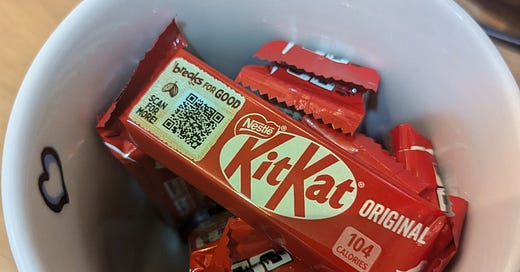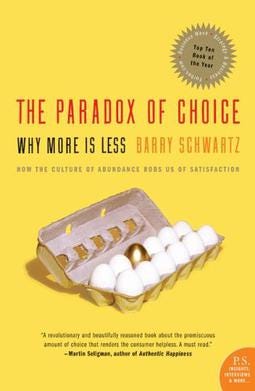Today, I found myself pondering the curious case of abundance. When you have a lot of something, you tend not to value it as much. If you're a billionaire, money probably feels as significant as Monopoly money. When nothing is out of reach, everything loses its shine. Now, I wouldn't know what it's like to be a billionaire; my bank balance starts with a minus sign, so I might appreciate money a tad more than most.
What set me on this train of thought was my daughter's behaviour around food. She's a picky eater who goes through phases of obsessively eating one particular thing. To keep up, we often buy that item in bulk. Let's use Kit Kats as an example because everyone loves a good Kit Kat (and they make for a tasty metaphor).
We frequently buy a 24-pack of two-fingered Kit Kats, planning to include them in our kids' packed lunches: one bar per child per school day. In theory, this stash should last 12 school days. But the moment those Kit Kats find a home in our cupboard, my daughter transforms into a stealthy chocolate ninja. Empty wrappers mysteriously appear under her bed, and the Kit Kat mountain dwindles into a molehill within a week.
We've resorted to hiding the chocolate treasure and rationing out bars like in wartime Britain. The mere sight of abundance to my daughter seems to trigger a "must-eat-all-the-Kit-Kats" response. One extra bar here and there didn't seem significant to her because, after all, there were so many!
This got me thinking: does abundance make us value things less? Taking time, for instance. If I have a week off work, seven glorious days of freedom, you'd think I'd conquer my to-do list with the zeal of a DIY superhero. Paint the shed door? Easy. Damp-proof the living room wall? No problem. Install that banister on the staircase? Piece of cake. But because I perceive I have so much time, I end up binge-watching Netflix and taking afternoon naps that would make a cat jealous. My abundant free time feels less valuable, so I squander it.
What's going on here? Psychologically, when we perceive something as abundant, we often deem it less valuable, a phenomenon known as the "Abundance Paradox" can be applied to many different areas of life including:
Clothing Overload: Ever stood before a jam-packed wardrobe and thought, "I have nothing to wear"? With so many options, each item feels less special.
Email Inbox Flood: When your inbox is overflowing, individual emails seem less important, and you might ignore crucial messages.
Social Media Scrolling: With an endless feed of content, each post competes for attention, and we value individual pieces of information less.
Barry Schwartz, in his book "The Paradox of Choice," delves into how having too many options can lead to decision paralysis and decreased satisfaction. In a world of plenty, scarcity can sometimes bring more joy. I'll write about this in the future as I discovered this idea in a weird way.
In essence, abundance can trick us into devaluing what we have, whether it's Kit Kats, time, or opportunities. Recognising this tendency is the first step towards appreciating the resources at our disposal.
So next time you buy a 24-pack of anything, or clear your calendar for some "me time," remember the Kit Kat Conundrum. Sometimes, less truly is more. Just because it's there, it doesn't mean you have to consume it.
Breaking Free from the Abundance Trap: Valuing What We Have
But knowing about the Abundance Paradox is only half the battle. How do we make sure we don't fall victim to it and start valuing everything as we should? Here are some strategies to help us appreciate our resources, no matter how plentiful they may seem.
1. Practice Mindful Consumption
Being present and fully engaged with what you're doing can significantly increase appreciation. Instead of mindlessly munching through a pile of Kit Kats, savour each one. Taste the chocolate, feel the crunch; make it an experience. (I am not being sponsored by Nestle by the way.)
2. Set Intentional Limits
Creating self-imposed boundaries can help maintain value. If you have a stash of treats, decide on a reasonable limit, perhaps one Kit Kat per day, or shock horror, one a week, and stick to it! This not only prolongs enjoyment but also keeps the novelty alive.
3. Cultivate Gratitude
Regularly acknowledging and appreciating what you have can shift your mindset. Keep a gratitude journal or take a moment each day to reflect on the things you value. Gratitude turns what we have into enough. I prefer to just take a moment every now and again to be thankful for the things I have.
5. Implement the One-In, One-Out Rule
For every new item you bring into your life, consider letting go of an old one. This keeps clutter at bay and ensures you truly value what you choose to keep.
6. Create Scarcity Deliberately
Scarcity increases value. By intentionally limiting access to certain items or experiences, you can enhance their worth. In our Kit Kat scenario, hiding the bulk stash and only having a few available can make each one feel more special.
7. Plan and Schedule Your Time
Time can feel abundant, especially on a lazy Sunday morning. But without a plan, it slips away. Schedule your tasks and leisure activities to make the most of your day. Setting specific goals creates a sense of urgency and importance. I'll be writing more on this topic in the future, I am very much in a productivity porn stage of my life.
8. Engage in Minimalism
Adopting minimalist principles can help you focus on what truly matters. By reducing excess, you appreciate the essentials more deeply. This doesn't mean you have to live like a monk; just be intentional about what you allow into your life.
9. Share with Others
Generosity combats the pitfalls of abundance. Sharing your resources, whether time, money, or Kit Kats, not only benefits others but also increases your own appreciation for what you have.
10. Reflect on Past Limitations
Remember times when you didn't have as much. Reflecting on periods of scarcity can heighten your appreciation for current abundance. It's a humbling exercise that provides perspective.
11. Educate and Involve Others
If you're noticing the Abundance Paradox affecting your family (looking at you, chocolate ninja), have an open conversation about it. Teaching children about value and moderation can help them develop healthier habits.
12. Set Personal Challenges
Challenge yourself to go without something you usually take for granted. A digital detox, a no-spend week, or a sugar-free month can reset your appreciation levels and break habitual overconsumption.
Turning Abundance into Appreciation
Abundance doesn't have to lead to devaluation. With mindful practices and intentional living, we can flip the script on the Abundance Paradox. Whether it's treasuring each Kit Kat, making the most of our time off, or genuinely appreciating the clothes in our wardrobe, valuing what we have enriches our lives.
So the next time you're faced with a mountain of anything, be it chocolate, time, or choices, remember that abundance is an opportunity to practise gratitude, not a licence to undervalue. After all, life is like a box of Kit Kats; it's better savoured slowly, one delightful finger at a time.
What examples of the abundance paradox are at play in your life? Did you even notice it in play?







I’ve also found that abundance begets abundance whereas lack begets lack. If I had a single bite of a Kit Kat, and think, this is enough, I’ve experienced the essence of a Kit Kat, I can be content. But I can have twenty Kit Kats unconsciously and not remember what it tastes like.
I love this! It’s something I think about a lot (which this post has made me realise). It’s hard to enjoy things when there’s too much of it, but I also worry there’ll some a time when there’s nothing left to like. I wonder if your daughter subconsciously wants to fast track to the bit where she can get to enjoy those KitKats fully, ie, when there’s only one left?